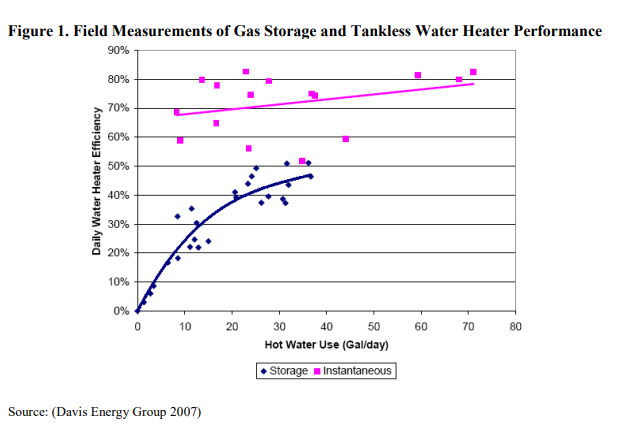The Pros & Cons of Tankless Water Heaters
Flushed with Knowledge:
The Pros, Cons & Types

Tankless water heaters are becoming increasingly popular among homeowners due to their space-saving size and efficiency. So you may find yourself asking “Should I switch to a tankless water heater?” We've compiled this detailed list of pros, cons and types of tankless water heaters to help you answer this question.
The main benefit of tankless water heaters is that they are designed to heat water as it is needed, rather than storing hot water in a tank. This eliminates the need for a large storage tank and can save money on energy costs over time. However, there are several different versions of tankless water heaters (our PlumbSmart tech can install them all) and each can have benefits & drawbacks that should be considered before making a purchase.
Here are some of the pros and cons of tankless water heater:
Pros:
Energy Efficiency:
Tankless water heaters are much more energy efficient than traditional storage tank water heaters. Since there is no need to store hot water, tankless water heaters only use energy when hot water is needed. This can save money on energy costs over time. The energy efficiency of a tankless water heater is typically measured using its Energy Factor (EF) rating. Ordinary hot water tanks are about 60% efficient while tankless range from 88-99% depending on the type installed. While helping with being more green and environmentally conscious, homeowners can also expect to save anywhere from $70 to $120 per year on their energy bills by switching to a tankless water heater and Home owners that use small amounts of hot water at a time can expect to average about 30% savings over a tank style heater.

Space-Saving:
Tankless water heaters are much smaller than traditional storage tank water heaters, as they do not require a large storage tank. This can be a major benefit for homeowners who are limited on space. The space savings provided by a tankless water heater will depend on the specific model and its installation requirements, but in general, tankless heaters are significantly smaller than tank-style heaters. For example, a typical tank-style water heater may have a diameter of 24 inches and a height of 60 inches or more, while a tankless heater may have a much smaller profile, with some models measuring just 10 inches wide by 18 inches tall. Some applications can actually have the heater installed outdoors and thereby freeing up all of the room inside where the old tank heater was originally located.
Unlimited Hot Water:
Unlike traditional storage tank water heaters, tankless water heaters can provide an unlimited supply of hot water as long as they are properly sized for the household's needs. This is useful for large households that require a lot of hot water: if you have a 40-gallon tank for a family of six people, then everyone is going to suffer from not having enough hot water. The key to ensuring an unlimited supply of hot water with a tankless heater is to properly size the unit based on the household's hot water needs. This will depend on factors such as the number of occupants in the home, the number of hot water appliances and fixtures in use, and the temperature of the incoming cold water.
Life cycle:
Typically a tankless heater has a mean life of about 20 years. With proper maintenance this can be even longer. The typical life cycle of a tank heater with proper maintenance is typically 7-10 years. Making a tankless last 2-3 times longer than that of a tank style.
Cons
Initial Costs:
Tankless water heaters are often more expensive than traditional storage tank water heaters. The average extra cost can be $2500-3500 which is a bit more than traditional tank water heaters. This can be a major drawback for homeowners who are on a budget and/or simply looking for a water heater based on price alone.
Maintenance:
Tankless water heaters require less maintenance than traditional storage tank water heaters. This includes flushing the system regularly, checking the venting system, cleaning the water inlet filter, checking for leaks and checking/ replacing key parts:
- Flushing the system: Over time, sediment and minerals can build up in the heat exchanger of a tankless water heater, which can reduce efficiency and eventually lead to damage. Flushing the system periodically can help remove these deposits and keep the unit running smoothly.
- Checking the venting system: Tankless water heaters require proper venting to prevent the buildup of carbon monoxide, which can be dangerous. Checking the venting system periodically can help ensure proper airflow and prevent issues with carbon monoxide.
- Inspecting the water inlet filter: Tankless water heaters have a water inlet filter that can become clogged with debris over time. Inspecting and cleaning this filter periodically can help prevent damage to the unit and ensure proper water flow.
- Checking for leaks: As with any water heating system, it's important to check for leaks periodically to prevent water damage and ensure proper operation.
- Checking the burner and ignition system: The burner and ignition system of a tankless water heater should be checked periodically to ensure proper operation and prevent issues with ignition or combustion.
Intermittent Hot Water:
Tankless water heaters can provide an unlimited supply of hot water, but they can struggle to keep up with high demand. There may be some limitations to their performance in extreme conditions, such as intermittent hot water when multiple hot water appliances or fixtures are in use simultaneously. This is typically caused by undersizing of the unit. Some of this high demand can be mitigated with time sensitive recirculation pumps but this does add extra installation expense. However, with proper sizing and installation, tankless water heaters can provide a reliable and consistent source of hot water for most households.
Here are Different Types of Water Heaters
Non-Condensing Tankless
The first generation of tankless water heaters, known as non-condensing tankless, rely on a heat exchanger to heat water on demand. Although these units achieve an energy factor (EF) of around .82-.85%, resulting in savings of about $75-$80 per year, they have some drawbacks. Non-condensing tankless heaters produce hot exhaust, which requires costly stainless steel venting. Additionally, these units have lower efficiency when used for short draws of hot water, such as washing hands.
Condensing Tankless
The second generation of tankless water heaters, known as condensing tankless, feature a second heat exchanger that captures heat from exhaust to heat water. This results in an EF of around .92-.94%, providing savings of about $90-$100 per year. The cooler exhaust produced by these units allows for less expensive PVC venting, but they are more costly upfront and have lower efficiency when used for short draws.
Condensing Hybrid Tankless:
The third generation of tankless water heaters, known as condensing hybrid tankless, incorporate a small holding tank, typically around 2 gallons. This small tank keeps a reservoir of hot water, eliminating the lower efficiency from short draws, and allowing these units to achieve a consistent efficiency of .92-.99%. This translates to the best savings in the industry, around $120 per year. Although these units are sometimes misleadingly called "tankless," their efficiency makes them an attractive option for homeowners.
Overall, tankless water heaters can be a great choice for homeowners looking to save space and energy costs. However, it is important to consider the pros and cons before making a decision. It also helps to know the efficiency and differences between different types of tankless. Tankless water heaters can be a great choice for some, but may not be suitable for all households. Call us at PlumbSmart today (828) 974-6147 and PlumbSmart will come give you a 100% free consultation and installation estimate on a new tankless system.
More Resources:
https://www.nahb.org/blog/2022/09/tankless-water-heaters-are-more-affordable
https://www.buildinggreen.com/blog/storage-vs-tankless-water-heaters
https://www.map-testing.com/assets/files/Minnesota%20Tankless%20WH%20study-2010.pdf
